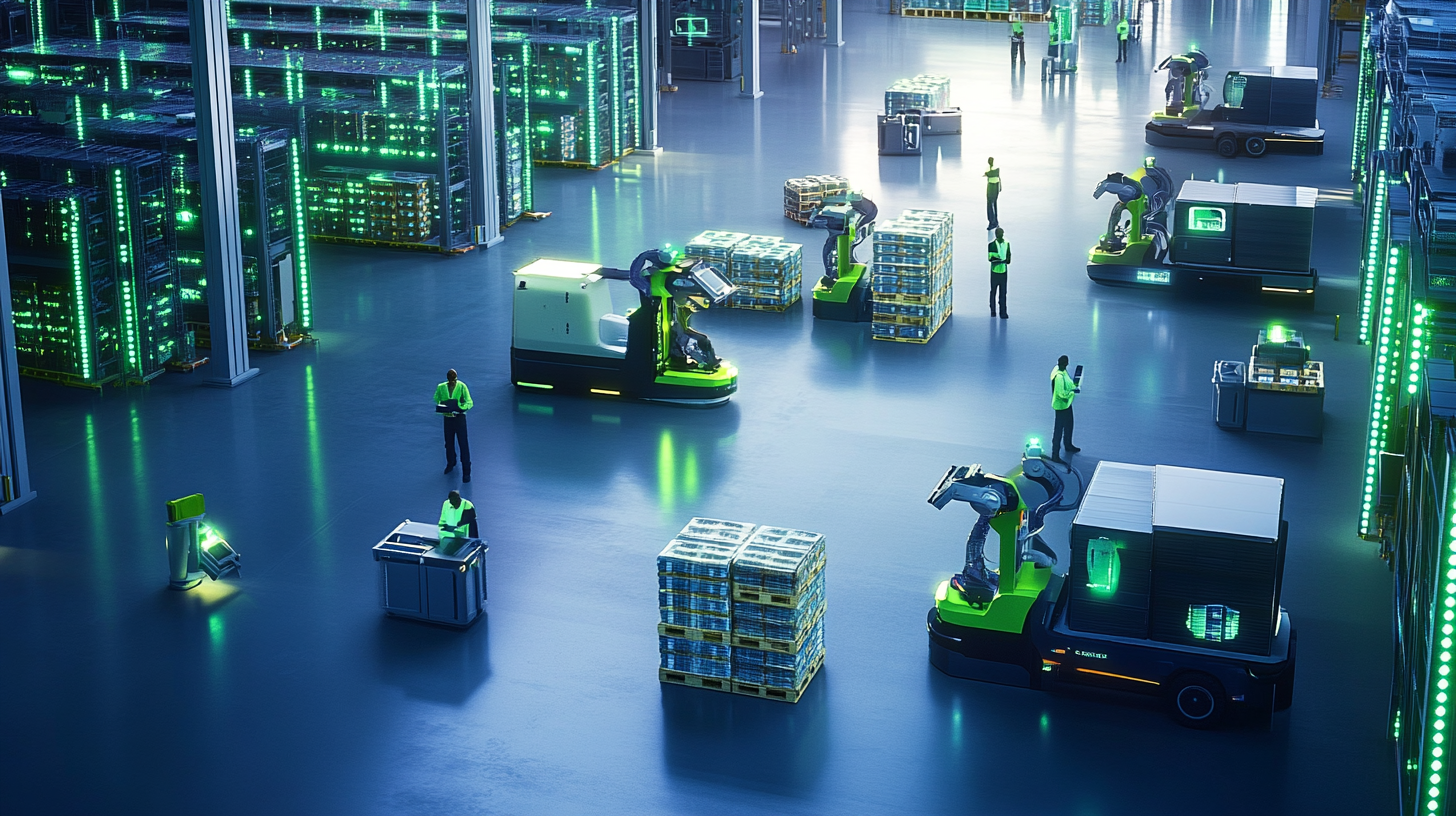
From welding to logistics: Where cobots (collaborative robots) will become indispensable in 2025 - Image: Xpert.Digital
🤖 The labor shortage and the role of cobots 🚀
🍀 Collaborative robots: A key to the shortage of skilled workers
The labor shortage or shortage of skilled workers is increasingly becoming a challenge in many industries, especially in Germany. Collaborative robots (cobots) play a crucial role in closing this gap. By 2025, cobots could become indispensable in areas such as welding and logistics, as they increase both efficiency and flexibility in work processes. The following explains the central areas of application and advantages of cobots.
🚜 Areas of application of cobots (collaborative robots)
🌟 1. Welding
Cobots are revolutionizing welding technology, especially in MAG welding (metal active gas welding) of unalloyed and low-alloy steels. They take on monotonous and precise tasks that are often strenuous or dangerous for people. Benefits of cobot welding include:
- Higher productivity: Cobots work continuously and deliver consistently high-quality results.
- Flexibility: They can be quickly programmed and adapted to different welding processes.
- Sustainability: The use of optimized process gases reduces weld spatter and minimizes rework.
- Occupational safety: Employees are relieved of dangerous tasks and can concentrate on more demanding tasks.
📦 2. Logistics
In warehousing and logistics, cobots take on repetitive tasks such as picking, packaging and quality control. Your advantages are:
- Increased efficiency: Cobots minimize errors in manual processing and increase precision.
- Flexibility: They can absorb seasonal fluctuations and be adapted to different tasks.
- Safety: Dangerous or physically demanding work is automated, reducing the risk of accidents.
⚙️ 3. Other industries
Cobots are used in the construction industry, food industry, jewelry making, metal processing and even healthcare. They take on tasks such as feeding workpieces, assembly work or preparing food in restaurants. Their ability to work directly with people opens up new possibilities in areas that have rarely been automated.
🌍 Advantages of cobots in the fight against the shortage of skilled workers
- Relief from monotonous tasks: Cobots take on repetitive tasks, freeing up employees for more complex tasks.
- Low investment costs: Cobots are cheaper than traditional industrial robots and offer a quick return on investment (ROI). Leasing models make it easier for small and medium-sized companies (SMEs) in particular to get started with automation.
- Flexibility and scalability: Cobots can be easily programmed and adapted to different production requirements.
- New professional fields: The introduction of cobots creates new jobs in programming, maintenance and monitoring of the robots.
- Competitiveness: By using cobots, companies can produce more efficiently and strengthen their market position.
🧩 Not just for industrial applications
Studies predict that there could be a shortage of around 2.9 million workers in Germany by 2025. The use of cobots will therefore not only remain limited to industrial applications, but will also expand into new sectors such as catering, healthcare or intralogistics. Advances in artificial intelligence (AI) and image processing will further expand the possible applications.
Cobots are therefore a central component in overcoming the shortage of skilled workers. They enable more efficient use of human labor, increase productivity and ensure the long-term competitiveness of many companies. 🚀
📣 Similar topics
- 🍀 Automation against the shortage of skilled workers: The role of cobots
- 🤖 Shaping the future: How cobots are revolutionizing the job market
- 🔧 Welding technology redefined: efficiency through cobots
- 📦 Flexible helpers: Cobots in the logistics industry
- 🏗️ Where technology supports people: Cobots in various industries
- 💡 Solving the skills shortage with technology: Advantages of cobots
- 🏥 From the warehouse to the hospital: Cobots in new sectors
- 📊 Increase productivity, increase safety: strategies with cobots
- 🚀 Securing competitiveness through cobots: A look into the future
- 🔍 The changing world of work: Cobots and the potential for new professional fields
#️⃣ Hashtags: #Skills shortage #Cobots #Welding technology #Logistics #Automation
Our recommendation: 🌍 Limitless reach 🔗 Networked 🌐 Multilingual 💪 Strong sales: 💡 Authentic with strategy 🚀 Innovation meets 🧠 Intuition
At a time when a company's digital presence determines its success, the challenge is how to make this presence authentic, individual and far-reaching. Xpert.Digital offers an innovative solution that positions itself as an intersection between an industry hub, a blog and a brand ambassador. It combines the advantages of communication and sales channels in a single platform and enables publication in 18 different languages. The cooperation with partner portals and the possibility of publishing articles on Google News and a press distribution list with around 8,000 journalists and readers maximize the reach and visibility of the content. This represents an essential factor in external sales & marketing (SMarketing).
More about it here:
🤖🔧 Collaborative robots: The smart solution for Industry 4.0 - whether welding, mobile manipulators or intelligent grippers
🌟 Collaborative robots: The smart solution for Industry 4.0
Collaborative robots have become a central part of the fourth industrial revolution, the so-called Industry 4.0. These intelligent machines work hand in hand with people, opening up new possibilities in manufacturing, logistics and beyond. They not only offer increased efficiency, but also the flexibility to react quickly to changing requirements. From welding to mobile manipulators to intelligent grippers, cobots are the driving force behind industrial modernization.
🤔 What makes collaborative robots so special?
Unlike traditional industrial robots, which often work in shielded areas to ensure employee safety, cobots are specifically designed to work with people. Thanks to advanced sensors, integrated safety mechanisms and sophisticated software, cobots can operate in close proximity to people without the need for physical protection. This not only means greater safety, but also more efficient use of the available space in production facilities.
A key advantage of cobots is their user-friendliness. They are easy to program and can be operated without any special specialist knowledge. This makes them ideal for small and medium-sized businesses that cannot dedicate extensive resources to robotics.
🔥 Welding with cobots: precision and efficiency
One of the most common applications of collaborative robots is welding. This is where cobots offer enormous advantages as they can deliver precise, consistent and repeatable results. While a human welder might make mistakes due to fatigue or lack of concentration, a cobot works with consistent accuracy. This is particularly invaluable for complex or repetitive tasks.
Modern cobots can be programmed to seamlessly switch between different welding methods such as MIG, MAG or TIG. Additionally, they can be equipped with cameras and sensors to make adjustments during the welding process and correct errors in real time. This flexibility allows companies to optimize their production processes while improving the quality of their products.
🚗 Mobile manipulators: flexibility on wheels
Another innovative application of collaborative robots is mobile manipulators. These robots combine the precision of a cobot with the mobility of autonomous vehicles. You are able to move freely within a production hall and carry out tasks at different locations. This makes it an ideal solution for dynamic production environments where flexibility is required.
Mobile manipulators can be used, for example, to transport materials, carry out inventory or operate machines. Thanks to modern navigation systems, they can recognize and avoid obstacles, which makes their integration into existing work environments easier. With the ability to operate autonomously while working closely with human employees, mobile manipulators represent a significant step towards fully connected production facilities.
🛠️ Intelligent grippers: More than just a tool
Another area where cobots excel is in the use of intelligent grippers. These grippers are equipped with sensors that allow them to measure pressure, temperature and material properties. This allows them to safely grasp and handle delicate or irregular objects. Smart grippers are particularly useful in the electronics and food industries, where precision and care are crucial.
Through the use of artificial intelligence, these grippers can even learn. They can adapt their gripping strategies to work more efficiently and avoid damage to products. Smart grippers offer exceptional versatility as they are able to handle a wide range of tasks - from packaging to assembling complex components.
🛡️ The role of cobots in Industry 4.0
Cobots are more than just tools – they are an integral part of the digitalized and networked factory of tomorrow. Industry 4.0 is characterized by the fusion of cyber-physical systems, the Internet of Things (IoT) and big data. Cobots play a key role in this context as they can collect, analyze and share data in real time.
With these capabilities, cobots help increase efficiency and transparency in production processes. For example, you can use operational data to plan preventative maintenance and thus minimize downtime. In addition, they enable greater adaptability to customer needs as production lines can be changed more quickly to fulfill individual orders.
💡 Economic and social benefits
The benefits of collaborative robots are not just limited to industry. They also offer social and economic benefits. By automating repetitive and strenuous tasks, cobots free up human employees to focus on creative and strategic activities. This not only leads to higher job satisfaction, but also an improvement in the quality of work.
Cobots also open up new opportunities for companies of all sizes. While traditional robotics solutions are often costly and complex to implement, cobots are relatively affordable and can be deployed quickly. This also allows small businesses to benefit from the benefits of automation and remain competitive.
🛠 Existing workflows require careful planning 🚀
Despite their numerous advantages, cobots also face challenges. Integration into existing workflows requires careful planning and sometimes process adjustment. Companies also need to ensure that their employees are sufficiently trained to work effectively with the robots.
However, the future of collaborative robotics is bright. Advances in areas such as artificial intelligence, sensing and materials science will further improve the capabilities of cobots. In the coming years, cobots could find their way into even more industries, from medicine to agriculture to space travel.
📌 Most innovative technology in Industry 4.0
Collaborative robots are one of the most innovative technologies in Industry 4.0. Not only do they offer increased efficiency and flexibility, but they also help improve working conditions. From welding work to mobile manipulators to intelligent grippers – cobots open up new possibilities and set standards for modern production. As this technology continues to evolve, they will undoubtedly play an increasingly important role in the industry and beyond.
📣 Similar topics
- 🍀 Efficient production processes: How cobots are transforming the industry
- 🤖 Future of Work: Collaborative Robotics in Industry 4.0
- 🔧 Welding rethought: Cobots as a game changer
- 🚀 Mobile manipulators: Flexibility is the focus of the industry
- 🛠️ Intelligent grippers: precision and adaptability
- 🌐 Cobots and IoT: Linking people, machines and data
- 💡 User-friendliness redefined: Cobots for SMEs
- 🔍 Challenges and potential: Cobots as partners of the future
- 🌟 Economic success through cobots: opportunities for small businesses
- 📊 Safety and efficiency: How cobots are revolutionizing workplaces
#️⃣ Hashtags: #Industrie40 #Cobots #Robotics #Production Processes #Automation
We are there for you - advice - planning - implementation - project management
☑️ SME support in strategy, consulting, planning and implementation
☑️ Creation or realignment of the digital strategy and digitalization
☑️ Expansion and optimization of international sales processes
☑️ Global & Digital B2B trading platforms
☑️ Pioneer Business Development
I would be happy to serve as your personal advisor.
You can contact me by filling out the contact form below or simply call me on +49 89 89 674 804 (Munich) .
I'm looking forward to our joint project.
Xpert.Digital - Konrad Wolfenstein
Xpert.Digital is a hub for industry with a focus on digitalization, mechanical engineering, logistics/intralogistics and photovoltaics.
With our 360° business development solution, we support well-known companies from new business to after sales.
Market intelligence, smarketing, marketing automation, content development, PR, mail campaigns, personalized social media and lead nurturing are part of our digital tools.
You can find out more at: www.xpert.digital - www.xpert.solar - www.xpert.plus

